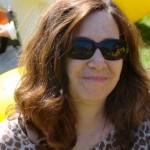 Sitting at my computer in my bedroom I can hear an old man screaming at my daughter. He says, “Get back here! You are being very disrespectful!” She is sitting at her father’s desk in the living room, crying and staring at the ground. The normally cordial and gentle rabbi is on Skype attempting to go over her Torah portion with her. She had gone on a quest searching the apartment for Wite Out without informing him, leaving him looking at an empty chair. This is not a good situation, and I have a feeling it will end badly.
Sitting at my computer in my bedroom I can hear an old man screaming at my daughter. He says, “Get back here! You are being very disrespectful!” She is sitting at her father’s desk in the living room, crying and staring at the ground. The normally cordial and gentle rabbi is on Skype attempting to go over her Torah portion with her. She had gone on a quest searching the apartment for Wite Out without informing him, leaving him looking at an empty chair. This is not a good situation, and I have a feeling it will end badly.
My 12-year-old daughter’s Bat Mitzvah is coming up in a few months. For the most part I don’t mind planning the event. It’s a lot of work, and I wouldn’t want to plan events for a living, but I can do it. I can set up all the moving pieces. I’ve arranged the religious service, DJ party and lunch at an atmospheric factory converted into a restaurant in Williamsburg, Brooklyn. Far removed from the deli platter back at the house that marked my own coming of age.
I have vivid memories of my own tempestuous adolescence, so now it is my turn to nurture a moody, spirited girl. As a quiet, serious, bookish kid, I wanted an existential, meaningful reason to believe in Judaism. I had some friends, but I wasn’t that social at 13, so, the justification of “You’ll have a party with all your friends! You’ll get presents!” didn’t cut it with me. My daughter, however, is interested in inviting a horde of teenagers and is balking at the absence of a photo booth.
I remember 12 as a painful, awkward age. I was not comfortable in my new body yet, and I felt ugly. I was very skinny, tall and gangly and I had acne. My daughter is more at ease, more graceful and more stylish (although the low-cut bellbottoms dragging behind me signify a grungier era). Or maybe this is just a perception from the other side. She is an athlete on the track team, running 400 meter and one mile races with ease. But, while I didn’t have to think twice about going to the area high school in ninth grade, my daughter has the added pressure of competing to get into one of NYC’s top high schools during this same time period. She knows she is smart and hardworking, but not a dazzling math wizard, so the whole process is very stressful for her. Simultaneous to her Bat Mitzvah preparations she is taking a labor intensive test prep course. I pushed the Bat Mitzvah back a few months after her birthday so the two events would not completely overlap, but still, having to do the work for both huge milestones in the same season is putting her over the edge.
I did not grow up in an observant household. My parents sent me to Hebrew school at a Reform congregation in a leafy suburb with many of my schoolmates. The main thrust of the curriculum was remembrance of the Holocaust. We were shown Night and Fog, a documentary about the death camps: featuring lampshades made of Jewish skin. We were taught that if you scratched the surface, most non-Jews were anti-Semitic, proven by the Nazis. Israel was the Promised Land, the one place on Earth where we are the majority, where no one could persecute or deport us. Anyone criticizing anything at all about Israel or its political policies was branded anti-Semitic.
This congregation was presided over by a playful, joking rabbi, who liked to walk around saying, “Have you seen the rabbi?” When I told my mother he seemed like a fool and I wanted to learn more about Judaism, she said, “No, he’s not a scholar. But he’s a nice guy. He’s not arrogant like other rabbis.”
I picked our current congregation after attending High Holiday services for Rosh Hashanah and Yom Kippur in a barely renovated 19th century cathedral of a synagogue on the Lower East Side of Manhattan. I loved the talented band playing both classical and Klezmer music, and the familiar ancient prayers. And while this rabbi has crossed the line into New Age thinking and lapsed into talk about angels, he is welcoming to non-Jews, of which my husband is one. Forty years later, the wound of the Holocaust has lessened, and it is possible to criticize Israeli policy without being branded a traitor. The Hebrew school stresses joy, not suspicion and paranoia, and there is a weekly service of Israeli and Jewish music, and classes full of discussion. This congregation has no permanent building of its own, hence no building fund, and the Hebrew school has met in yoga and dance and drama studios, with Friday night services at a Quaker meeting house.
I had hoped that this journey with my daughter would be inspiring and spiritual for both of us, a connection to our ancient heritage. The reality is an exercise in motivating a kid to do what she doesn’t want to do, and attempting to help her organize and structure her studying time. I’ve given up trying to find a spark of illumination or meaning for her.
We’ve broken down what she needs to learn into parts, and are trying to tackle each part. After one horribly upsetting phone call with the rabbi, some emails back and forth and a family meeting, we are more or less back on track. She has begun Skyping with the rabbi again. I would not say she is joyful about it, but she is resigned to her fate and more diligent. The experience has not brought out the best in either of us. But I am still holding out hope that there will be a magical spiritual moment on the day of the ceremony that will make it all worth it.
 Randi Hoffman is the 53-year-old mother of a 12-year-old daughter. She has written art and book reviews for The Women’s Review of Books, Tribes, New Mexico Magazine, and the New York Blade, among other publications. She has studied memoir writing in Ariel Gore’s Literary Kitchen. She lives with her novelist husband and daughter in the East Village of Manhattan.
Randi Hoffman is the 53-year-old mother of a 12-year-old daughter. She has written art and book reviews for The Women’s Review of Books, Tribes, New Mexico Magazine, and the New York Blade, among other publications. She has studied memoir writing in Ariel Gore’s Literary Kitchen. She lives with her novelist husband and daughter in the East Village of Manhattan.
